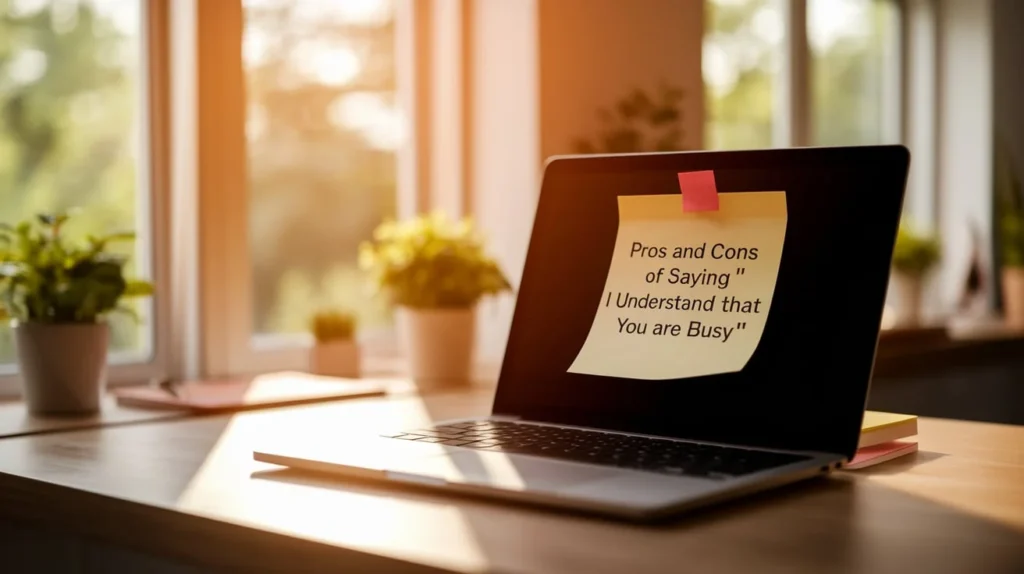Have you ever wanted to acknowledge someone’s busyness while also expressing understanding and empathy? It’s tricky to find the right words sometimes, especially if you want to be polite and considerate. Saying “I understand that you are busy” can feel a bit impersonal, and it doesn’t always convey the level of care you’d like to express.
The good news is, there are plenty of other ways to say this that feel more meaningful and thoughtful. In this article, we’ll explore 20 other ways to say “I understand that you are busy” that can help you sound more personal, thoughtful, and understanding. Let’s dive in!
What Does “I Understand That You Are Busy” Mean?
Before we jump into the alternatives, let’s break down what “I understand that you are busy” really means. When you say this, you’re acknowledging that someone’s schedule is full and that they may have a lot on their plate. It’s a polite way to show empathy and let them know you’re not expecting too much from them right now. However, while this is perfectly acceptable, it can sound a bit formal or detached.
The main idea behind this phrase is to express awareness of someone’s busy schedule without sounding demanding. It’s a way of saying, “I get it, life is hectic, and I’m not rushing you.”
Is It Professional/Polite to Say “I Understand That You Are Busy”?
Absolutely! Saying “I understand that you are busy” is polite and respectful. It shows that you’re aware of the other person’s time constraints and that you’re not expecting an immediate response. It’s especially useful in professional settings where deadlines, meetings, and constant communication are part of everyday life.
However, it’s important to be mindful of how you use this phrase. If overused, it might come off as impersonal or insincere. It’s always better to add a little personalization or warmth to your communication to keep things feeling more genuine.
Pros and Cons of Saying “I Understand That You Are Busy”

Pros:
- It shows empathy and consideration for the other person’s time.
- It can help ease any tension if you’re asking for something from a busy person.
- It makes your communication feel more personal and understanding.
Cons:
- It may sound too formal or repetitive if used too frequently.
- Sometimes it might come across as passive, without actively offering support or a solution.
Synonyms for “I Understand That You Are Busy”
- “I Understand That You’re Busy”
- “I Know You’re Probably Swamped Right Now”
- “I Appreciate That You Have a Lot on Your Plate”
- “I Realize You’re In the Middle of Something”
- “I Get That You Have a Lot Going On”
- “I Recognize That You’re Juggling a Lot”
- “I Understand Time Is Tight for You Right Now”
- “I Know You’re Currently Handling Multiple Things”
- “I Get That You Have a Full To-Do List”
- “I Appreciate How Busy You Must Be”
- “I Can Imagine How Full Your Schedule Is”
- “I Know You’ve Got a Lot Going On”
- “I Get That You’re Incredibly Busy”
- “I Realize Your Time Is Limited Right Now”
- “I Understand You’re Navigating a Tight Schedule”
- “I Understand You’re Currently Swamped”
- “I Appreciate How Much You Have on Your Plate Right Now”
- “I Realize You’re Under a Lot of Pressure Right Now”
- “I Know How Demanding Your Schedule Is”
- “I Understand You’ve Got a Lot on Your Plate Right Now”
1. “I Totally Get That You’re Swamped Right Now”
This phrase is a more casual, friendly alternative to “I understand that you are busy.” It adds a touch of empathy and personality, making your message feel warmer.
Scenario Example:
Hey Sarah,
No worries at all—I totally get that you’re swamped right now. Take all the time you need, and I’ll be here when you’re ready to chat!
Best,
John
Best Use: When you’re trying to add a personal touch, especially in informal communication with someone you know well.
Additional Note: This version can be used when you want to sound friendly and understanding without being too formal. It can work in both professional and personal contexts, but just be careful not to use it if you’re writing to someone very senior or in a very formal setting.
2. “I Understand That You Have a Lot on Your Plate”
This one is great when you want to acknowledge that the other person is juggling many tasks and responsibilities. It’s a bit more serious than some alternatives but still caring.
Scenario Example:
Hi Michael,
I totally understand that you have a lot on your plate at the moment. No rush at all on the report—take your time, and I’ll be happy to wait!
Best regards,
Emma
Best Use: In more formal settings, especially when dealing with colleagues or clients who may have multiple deadlines to meet.
Additional Note: It’s a good way to acknowledge the depth of someone’s workload without sounding dismissive. It can show that you are being considerate of their situation.
3. “I Know Things Are Busy for You Right Now”
This phrase is perfect when you want to be empathetic without assuming too much about the other person’s situation. It’s simple and to the point.
Scenario Example:
Hi Alex,
I know things are busy for you right now, so I appreciate any time you can spare. Let me know if there’s a better time to discuss the project!
Thanks,
Riley
Best Use: Great for expressing understanding when you’re aware of someone’s packed schedule but don’t know exactly what they’re dealing with.
Additional Note: Use this when you’re unsure of the exact scope of someone’s busyness but want to show you recognize they’re dealing with a lot.
4. “I Realize You Must Have a Full Schedule”
This is a bit more formal, but still an effective way to acknowledge someone’s busy life. It’s a thoughtful way of expressing care without sounding too casual.
Scenario Example:
Dear Karen,
I realize you must have a full schedule right now. Please don’t worry about getting back to me immediately—whenever it’s convenient for you will be great.
Kind regards,
David
Best Use: In professional environments where you want to show respect for the person’s time and responsibilities.
Additional Note: This alternative works wells or formal communication, especially when speaking to a supervisor or client.
5. “I Totally Appreciate How Packed Your Day Must Be”
This phrase conveys both understanding and appreciation. It acknowledges the busyness while expressing gratitude for any time the person might give you.
Scenario Example:
Hi Jamie,
I totally appreciate how packed your day must be, so there’s no rush to get back to me. Whenever you have a moment works for me!
Warmly,
Jessica
Best Use: When you’re looking to add a more appreciative tone while still acknowledging the person’s packed schedule.
Additional Note: Use this when you want to show extra gratitude or when you’re making a request, and you want the person to feel acknowledged.
6. “I Recognize That You’re Juggling a Lot”
This phrase adds a sense of respect for how the person is managing multiple responsibilities at once. It’s great for showing that you understand they are handling a lot and still making an effort to stay on top of things.
Scenario Example:
Hey Taylor,
I recognize that you’re juggling a lot these days, so don’t worry about this right away. Whenever you have a free moment, just let me know.
Thanks so much,
Zoe
Best Use: Perfect for colleagues or clients who are managing multiple projects or tasks simultaneously.
Additional Note: This phrase is particularly helpful when you’re aware that the person is balancing a lot of different responsibilities, both personal and professional.
7. “I Understand Time Is Tight for You Right Now”
If you know someone is particularly pressed for time, this phrase directly acknowledges that without sounding overly sympathetic. It’s a great way to show that you respect their time limitations.
Scenario Example:
Hello Chris,
I understand time is tight for you right now, so please take the time you need to get back to me. No rush at all.
Best,
Laura
Best Use: When someone is facing a time crunch—maybe due to deadlines or a busy work period—and you want to be considerate of their limited availability.
Additional Note: Use this when you want to express both understanding and patience while giving the person space to deal with their busy schedule.
8. “I Know You’re Currently Handling Multiple Things”
This phrase is perfect when you’re aware that someone is handling multiple tasks, projects, or even life events. It shows empathy without being too formal.
Scenario Example:
Hi Mark,
I know you’re currently handling multiple things, so don’t worry about responding immediately. I’ll follow up next week.
Best,
Emma
Best Use: Ideal when you’re speaking to someone who has a lot of things on their plate but still needs to keep up with various responsibilities.
Additional Note: This works well when you’re being mindful of the other person’s workload, without sounding like you’re too focused on their stress.
9. “I Get That You Have a Full To-Do List”
This phrase is short and to the point, but it’s a clear and respectful way to acknowledge that the person has many things on their schedule to take care of. It’s not overly formal, and it conveys understanding in a concise manner.
Scenario Example:
Hey Olivia,
I get that you have a full to-do list right now, so please don’t feel pressured. Let me know when you have the bandwidth to chat.
Best,
Jonah
Best Use: When you’re speaking to someone you know well and want to show that you understand the load they’re dealing with.
Additional Note: This alternative keeps things light and casual, perfect for informal situations where you want to acknowledge someone’s busy workload without sounding too stiff.
10. “I Appreciate How Busy You Must Be”
This alternative is a polite and respectful way to acknowledge someone’s busy schedule while expressing gratitude for their time. It emphasizes both understanding and appreciation in a balanced way.
Scenario Example:
Hi Rachel,
I appreciate how busy you must be, so I’m happy to wait until you have the time to discuss this. Please take your time!
Warm regards,
Henry
Best Use: When you want to show appreciation for someone’s time and still acknowledge their hectic schedule. It works well in both personal and professional settings.
Additional Note: This one works well in customer service or client communications, where showing appreciation for someone’s time can foster positive relationships.
11. “I Can Imagine How Full Your Schedule Is”
This phrase strikes a balance between empathy and understanding. It implies that you understand the person’s busy life without overstepping, and it’s a great way to show that you respect their time.
Scenario Example:
Hi David,
I can imagine how full your schedule is, so I completely understand if you need a bit more time to review the proposal. Let me know when you’re ready.
Best,
Natalie
Best Use: Ideal when you know the person has a packed agenda but still want to check in with them without sounding demanding.
Additional Note: This phrase is effective because it doesn’t assume the person’s schedule exactly, but it acknowledges that their time is limited.
12. “I Know You’ve Got a Lot Going On”
This is another straightforward, empathetic alternative. It’s casual and makes it clear that you understand that the person has multiple things to juggle, whether professionally or personally.
Scenario Example:
Hey Jessica,
I know you’ve got a lot going on, so feel free to get back to me when you have the chance. No rush at all!
Best,
Mark
Best Use: Great when you want to acknowledge that someone is handling multiple responsibilities but still make it clear that there’s no pressure.
Additional Note: It’s friendly and informal, so it’s best used with colleagues or people you know well. It also works for recognizing both professional and personal challenges.
13. “I Get That You’re Incredibly Busy”
This is a more direct and casual way of recognizing someone’s busy schedule. It’s short, to the point, and it shows that you’re aware of the demands on their time.
Scenario Example:
Hi Sarah,
I get that you’re incredibly busy, so please don’t worry about this right now. We can touch base when things settle down for you.
Best regards,
Tom
Best Use: When you want to be brief but still empathetic, especially in fast-paced work environments.
Additional Note: Use this when you know the person is facing a heavy workload, but you don’t want to over-emphasize the pressure they might be under.
14. “I Realize Your Time Is Limited Right Now”
This phrase is perfect for professional environments where you want to convey respect for someone’s time constraints. It’s polite and shows that you understand their situation, but it doesn’t assume too much about what they’re dealing with.
Scenario Example:
Dear Emily,
I realize your time is limited right now, so please take your time with the request. We can revisit it when your schedule permits.
Sincerely,
Andrew
Best Use: Use this in formal communications or when dealing with high-level professionals, clients, or anyone who is managing tight schedules.
Additional Note: This works particularly well when you want to communicate understanding in a professional, respectful tone without coming off as overly casual.
15. “I Understand You’re Navigating a Tight Schedule”
This phrase is a bit more sophisticated and works well in professional contexts where you want to recognize that the person is managing a particularly busy or restricted timetable.
Scenario Example:
Hello Jason,
I understand you’re navigating a tight schedule at the moment, so I’ll check in with you next week if that’s more convenient.
Best regards,
Olivia
Best Use: Perfect when you know the person is working with strict deadlines or has a demanding calendar to balance.
Additional Note: It’s slightly more formal, making it suitable for professional and corporate settings, especially when dealing with senior executives or clients.
16. “I Understand You’re Currently Swamped”
This phrase is both casual and empathetic. “Swamped” adds a bit of personality, showing you recognize the intensity of the person’s workload, and it’s a great way to express both empathy and respect for their time.
Scenario Example:
Hi Ben,
I understand you’re currently swamped with work, so there’s no rush on this. Let me know when you have a chance to go over it.
Cheers,
Rachel
Best Use: Best used in informal, yet respectful settings when you want to acknowledge that the person is feeling overwhelmed but still convey patience.
Additional Note: This is ideal for friends, colleagues, or anyone in a work environment who is juggling multiple tasks or projects. It’s a bit more relaxed and friendly.
17. “I Appreciate How Much You Have on Your Plate Right Now”
This phrase uses the metaphor of a “plate” to describe the heavy workload or personal responsibilities someone may be dealing with. It’s both empathetic and slightly more formal, which can work well in both personal and professional settings.
Scenario Example:
Hey Alex,
I appreciate how much you have on your plate right now, so I’m happy to wait for your response. Let me know when it’s a better time for you.
Best,
Zoe
Best Use: Ideal when you want to convey respect for someone’s heavy workload or life circumstances without being too casual.
Additional Note: This phrase is useful for clients, colleagues, or friends. It shows that you understand the weight of what they’re dealing with and are willing to give them space.
18. “I Realize You’re Under a Lot of Pressure Right Now”
This is a direct and compassionate way to acknowledge that someone might be facing a stressful time. It focuses on the pressure they’re under, which can be particularly relevant for those in high-stakes situations.
Scenario Example:
Hi Maria,
I realize you’re under a lot of pressure right now, so please don’t feel any rush. We can talk when you have a bit more breathing room.
Best regards,
David
Best Use: Use when you know the person is under stress—whether from tight deadlines, big projects, or personal issues—and you want to be supportive and considerate.
Additional Note: This phrase has a more serious tone, so it works best in situations where you want to acknowledge someone’s pressure without trivializing it.
19. “I Know How Demanding Your Schedule Is”
This one is straightforward, acknowledging that the person’s schedule is demanding without over-explaining. It’s simple and polite, making it great for both professional and casual conversations.
Scenario Example:
Hey Sophie,
I know how demanding your schedule is, so I don’t want to add to your plate. Just let me know when you can get back to me.
Take care,
Liam
Best Use: Perfect for anyone who has a particularly full calendar or demanding work life. This phrase strikes a good balance between professional and casual.
Additional Note: This phrase is concise and gets to the point, so it’s ideal when you need to express empathy but don’t want to dwell too much on the person’s busy schedule.
20. “I Understand You’ve Got a Lot on Your Plate Right Now”
This one is similar to the “on your plate” metaphor, but it adds a little more emphasis, suggesting that the person has a significant amount of work or responsibility. It’s both empathetic and considerate.
Scenario Example:
Hi Brian,
I understand you’ve got a lot on your plate right now, so please feel free to take your time with this. We can catch up when you’re free.
Best regards,
Megan
Best Use: Works well for anyone you know has multiple things to handle. It’s casual and friendly but still communicates respect for the person’s time.
Additional Note: This alternative is versatile enough to work in both personal and professional contexts. It’s especially effective when you know the person is dealing with more than usual.
Conclusion
Finding the right words to express empathy is a powerful tool for creating meaningful, considerate connections. Whether you’re acknowledging someone’s busy schedule or giving them space, these 20 alternatives to “I understand that you are busy” can help you communicate with warmth, respect, and care.
By choosing the right phrasing for the situation, you’ll not only show understanding but also demonstrate your thoughtfulness in a way that deepens your relationships.















